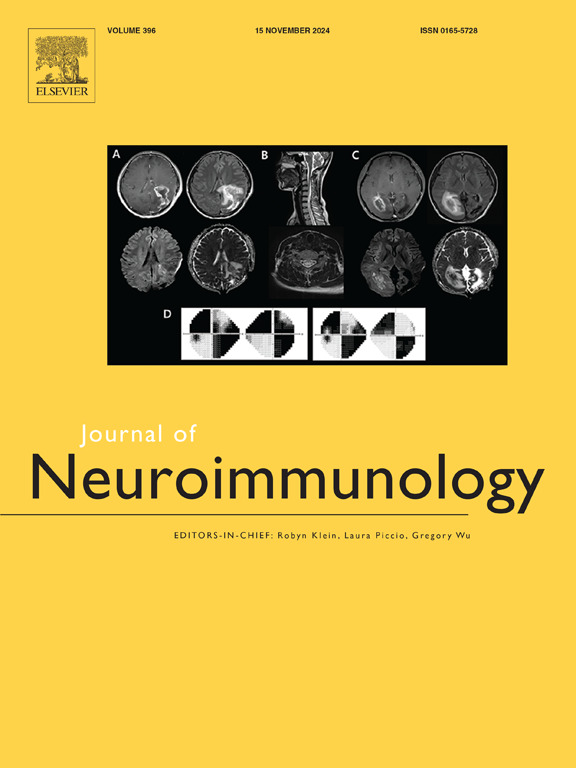Reversal of profound cortical atrophy with immunotherapy in pediatric anti-NMDA receptor encephalitis
IF 2.5
4区 医学
Q3 IMMUNOLOGY
引用次数: 0
Abstract
Anti-NMDA receptor (NMDAr) encephalitis is an autoimmune condition marked by neuropsychiatric symptoms and NMDAr IgG autoantibodies in the serum and/or cerebrospinal fluid. While MRI findings are often nonspecific or normal, the reversibility of imaging abnormalities with immunotherapy remains underexplored. We report a 3-year-old girl who presented with seizures, altered mental status, and encephalopathy diagnosed with medically refractory anti-NMDAR encephalitis. Initial neuroimaging was unremarkable, but subsequent MRIs revealed T2 hyperintensities and leptomeningeal enhancement. After delayed treatment with IVIG, methylprednisolone, Rituximab, and plasmapheresis, the patient showed clinical improvement. Observational MRI scans after treatment demonstrated reduced parenchymal volume loss and stabilization of T2 changes over 4.5 years. This case highlights the potential for clinical and radiographic improvement after treatment in anti-NMDAR encephalitis and the benefit of immunomodulatory therapy even years after presentation.
儿童抗nmda受体脑炎的免疫治疗逆转深度皮质萎缩
抗nmda受体(NMDAr)脑炎是一种以神经精神症状和血清和/或脑脊液中NMDAr IgG自身抗体为特征的自身免疫性疾病。虽然MRI结果通常是非特异性或正常的,但免疫治疗的成像异常的可逆性仍未得到充分探讨。我们报告一个3岁女孩,她表现为癫痫发作、精神状态改变和脑病,被诊断为医学上难治性抗nmdar脑炎。最初的神经影像学表现不明显,但随后的mri显示T2高信号和轻脑膜增强。经IVIG、甲基强的松龙、利妥昔单抗和血浆置换延迟治疗后,患者临床好转。治疗后的观察性MRI扫描显示,在4.5年的时间里,脑实质体积损失减少,T2变化稳定。该病例强调了抗nmdar脑炎治疗后临床和影像学改善的潜力,以及免疫调节治疗甚至在发病数年后的益处。
本文章由计算机程序翻译,如有差异,请以英文原文为准。
求助全文
约1分钟内获得全文
求助全文
来源期刊

Journal of neuroimmunology
医学-免疫学
CiteScore
6.10
自引率
3.00%
发文量
154
审稿时长
37 days
期刊介绍:
The Journal of Neuroimmunology affords a forum for the publication of works applying immunologic methodology to the furtherance of the neurological sciences. Studies on all branches of the neurosciences, particularly fundamental and applied neurobiology, neurology, neuropathology, neurochemistry, neurovirology, neuroendocrinology, neuromuscular research, neuropharmacology and psychology, which involve either immunologic methodology (e.g. immunocytochemistry) or fundamental immunology (e.g. antibody and lymphocyte assays), are considered for publication.
 求助内容:
求助内容: 应助结果提醒方式:
应助结果提醒方式:


